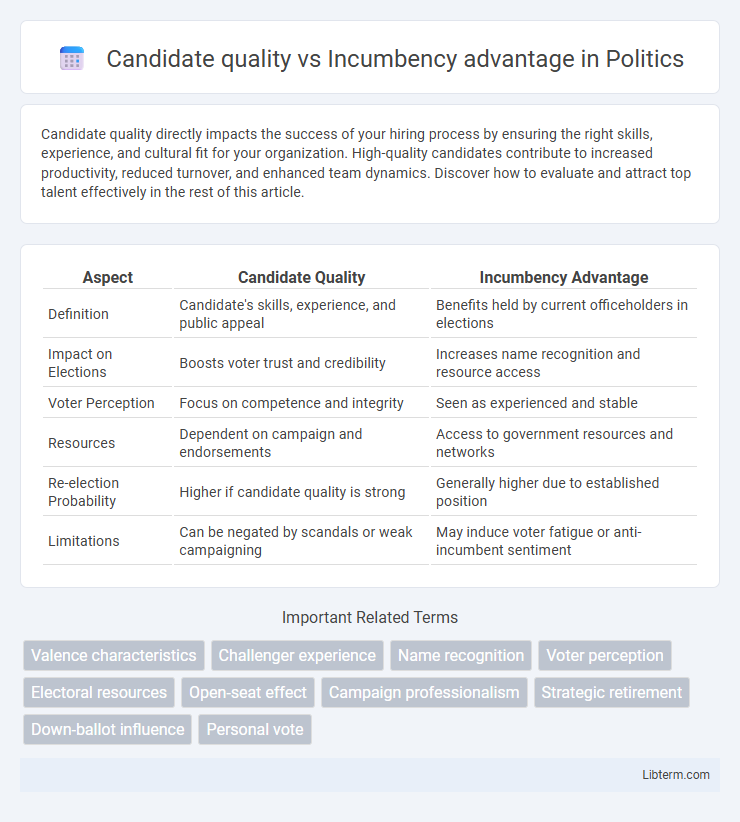Candidate quality directly impacts the success of your hiring process by ensuring the right skills, experience, and cultural fit for your organization. High-quality candidates contribute to increased productivity, reduced turnover, and enhanced team dynamics. Discover how to evaluate and attract top talent effectively in the rest of this article.
Table of Comparison
| Aspect | Candidate Quality | Incumbency Advantage |
|---|---|---|
| Definition | Candidate's skills, experience, and public appeal | Benefits held by current officeholders in elections |
| Impact on Elections | Boosts voter trust and credibility | Increases name recognition and resource access |
| Voter Perception | Focus on competence and integrity | Seen as experienced and stable |
| Resources | Dependent on campaign and endorsements | Access to government resources and networks |
| Re-election Probability | Higher if candidate quality is strong | Generally higher due to established position |
| Limitations | Can be negated by scandals or weak campaigning | May induce voter fatigue or anti-incumbent sentiment |
Defining Candidate Quality in Modern Elections
Candidate quality in modern elections refers to the attributes and competencies that enhance a contender's electability, such as prior political experience, educational background, leadership skills, and public appeal. Incumbency advantage often magnifies the perception of candidate quality by providing name recognition, established donor networks, and a record of constituency service. Evaluating candidate quality involves assessing both intrinsic qualifications and the strategic benefits conferred by holding office, which together influence electoral outcomes.
Understanding Incumbency Advantage: Key Factors
Incumbency advantage significantly enhances electoral success through name recognition, established voter relationships, and access to campaign resources. Candidate quality influences election outcomes by shaping voter perceptions, yet incumbents benefit from institutional support that often outweighs individual merit. Key factors driving incumbency advantage include constituent services, media exposure, and fundraising networks that create formidable barriers for challengers.
Historical Trends: Candidate Quality vs Incumbency
Historical trends reveal that incumbency advantage often amplifies election success despite candidate quality variations, with incumbents winning approximately 80-90% of House races since the 1960s. Studies indicate high-quality challengers--typically those with prior elected experience or strong fundraising--are more successful only when incumbents face significant scandals or demographic shifts. The durability of incumbency advantage suggests that name recognition, constituent services, and campaign resources consistently outweigh candidate quality in determining electoral outcomes.
Voter Perceptions: Quality or Incumbency?
Voter perceptions often weigh candidate quality against the incumbency advantage when making electoral decisions, with research indicating that while incumbents benefit from name recognition and established networks, high-quality challengers can overcome these advantages by demonstrating superior competence and policy expertise. Studies reveal that voters prioritize candidate quality in environments with increased political information and media scrutiny, leading to more competitive races despite incumbency. This dynamic suggests that the incumbency advantage is conditional, influenced heavily by perceived candidate attributes such as experience, integrity, and campaign effectiveness.
Campaign Resources: Leveling the Playing Field
Campaign resources significantly influence the balance between candidate quality and the incumbency advantage by providing crucial funding and support that can amplify a newcomer's visibility and outreach, narrowing the gap with established incumbents. High-quality challengers with substantial financial backing can invest in targeted advertising, grassroots mobilization, and digital engagement, which are essential to counteract incumbents' name recognition and entrenched networks. Effective resource allocation enables challengers to communicate their platforms more effectively, thereby leveling the electoral playing field and enhancing competitive dynamics in elections.
Media Influence on Candidate Evaluation
Media coverage significantly shapes voter perceptions of candidate quality by highlighting policy expertise, past achievements, and personal traits. Incumbents benefit from enhanced media exposure, which often emphasizes their experience and accomplishments, reinforcing their incumbency advantage. Consequently, media framing can amplify perceptions of candidate competence, making it a pivotal factor in electoral success.
Case Studies: Outsiders Defeating Incumbents
Case studies reveal that high-quality candidates, especially those with strong community ties, professional achievements, or effective campaign strategies, can overcome the incumbency advantage in elections. Notable examples include challengers who leverage dissatisfaction with sitting officials, innovative policy platforms, and targeted voter outreach to secure victories against entrenched incumbents. Research indicates that factors such as campaign financing, media presence, and voter mobilization play critical roles in empowering outsider candidates to defeat established officeholders.
Policy Performance and Voter Loyalty
Policy performance significantly influences candidate quality by demonstrating competence and aligning with voter expectations, which enhances the incumbent's perceived effectiveness. Voter loyalty often stems from positive policy outcomes delivered during an incumbent's term, reinforcing trust and diminishing the appeal of challengers. Strong policy results combined with entrenched voter allegiance create a formidable incumbency advantage, making it difficult for new candidates to gain traction.
Party Support: Boosting Quality or Reinforcing Incumbency
Party support plays a crucial role in boosting candidate quality by providing resources, endorsements, and strategic guidance that enhance campaign effectiveness and voter appeal. This support simultaneously reinforces incumbency advantage through established political networks, name recognition, and access to party infrastructure, making it harder for challengers to compete. Empirical studies show that parties prioritize backing high-quality candidates to maintain electoral dominance while leveraging incumbent benefits to secure consistent victories.
Future Trends: Shifts in Candidate Appeal and Incumbency
Future trends indicate a decline in incumbency advantage as voter emphasis shifts toward candidate quality, including charisma, expertise, and responsiveness to social issues. Data shows that electorates increasingly prioritize candidates with strong digital engagement and authentic community ties over traditional incumbency status. Emerging political landscapes suggest that well-qualified newcomers with innovative platforms may disrupt historic incumbency patterns, reshaping election dynamics.
Candidate quality Infographic

 libterm.com
libterm.com